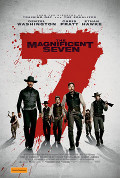
Directed by
Antoine Fuqua
133 minutes
Rated M
Reviewed by
Chris Thompson

The Magnificent 7
Synopsis: In 1879, the farming community of Rose Creek is being terrorised by Bartholomew Bogue (Peter Sarsgaard), a vicious bully who owns the nearby goldmine and wants to expand his mining interest on the homesteaders' lands. When he kills her husband in cold blood, Emma Cullen (Haley Bennett) and her friend, Teddy Q (Luke Grimes), ride to the next town in search of someone who can help. Here they encounter Sam Chisolm (Denzel Washington), a Kansas Warrant Officer who reluctantly agrees to help. Knowing that Bogue and his enforcers will not leave Rose Creek without spilling blood, Chisholm recruits a band of loners to join him in the fight: gambler Josh Faraday (Chris Pratt), Confederate war hero, Goodnight Robicheaux (Ethan Hawke) and his knife-throwing side-kick Billy Rocks (Byung-hun Lee), Mexican gunman, Vasquez (Manuel Garcia-Rulfo), reformed Indian hunter Jack Horne (Vincent D’Onofrio), and outcast Comanche warrior Red Harvest (Martin Sensmeier). Knowing they will be hopelessly outnumbered and with only one week before Bogue’s return with his men, they set out to teach the townspeople how to stand their ground.
It’s not hard to see why you might want to revisit a film like this with its seven lost souls who are offered the chance to redeem themselves by taking on a noble but seemingly hopeless cause that, in all likelihood, will cost them their lives. The problem with this version of the story, though, is that Sam Chisholm isn’t the gunslinger memorably portrayed by Yul Brynner in the '60s version; he’s a quasi-lawman who has crossed paths with Bogue before. The same is true for a number of other characters so their path to redemption is not so much of an imperative in this story. And that just leaves us with a lot of killing in the name of entertainment.
This new gang is quite the multi-cultural posse with an African-American, an Asian-American, a Mexican and a Native American filling the ranks. It’s a potentially interesting idea but the lack of engagement with or any exploration of what the mix of the band might say about the social politics of the day leaves the decision feeling more contrived than anything else, Washington being a prominent case in point. But what this film misses more than anything else is the personal interaction between the ‘seven’ and the townsfolk.
There are no real relationships here and with the ‘kid’ (played by Horst Buchholz in the '60s) being replaced by the Comanche we lose both the romance that that character brought to the tale and, more importantly, the coming-of-age story as the young hero-worshipper is confronted with the reality of men killing men. Without that kind of heart and emotion, what we’re left with is a film. which as it is explicitly acknowledges via Ms.Bennett bosomy grieving spouse is more about revenge than redemption. Even Washington, who is usually a sure bet in any film, seems adrift in the story and Sarsgaard as the villain is so two-dimensional that you almost expect him to be twirling a moustache. The only actor who makes a bit of a fist of it is D’Onofrio who manages to find a likeable character in Nic Pizzalatto and Richard Wenk’s enthusiastically cliché-ridden screenplay that has excised all the nobility and wit from a classic tale.
Fuqua has proven himself a capable director with films like Training Day (2001) and Southpaw (2015) but he’s also capable of dreary misfires like Tears of the Sun (2003) and, sadly, his less-than-magnificent new film is much closer to that work than the others.
Want something different?





